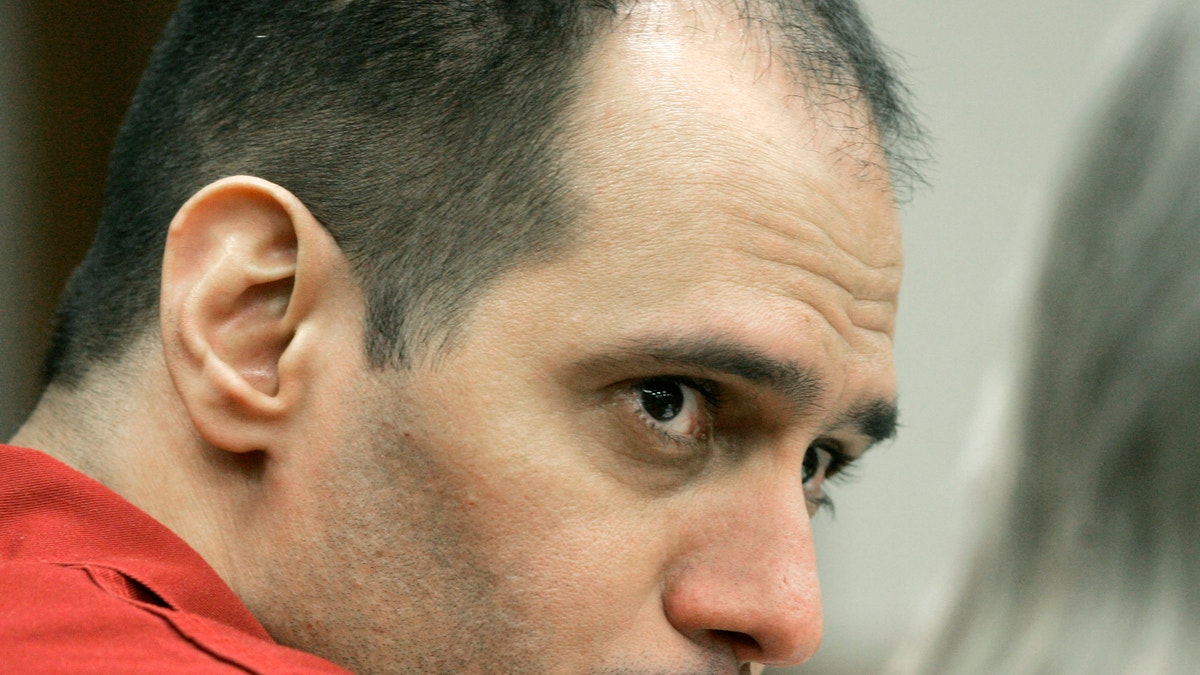
FILE - In this Tuesday, Jan. 9, 2007, file photo, death row inmate Juan Carlos Chavez is shown during the first day of hearings at a Miami-Dade County courtroom in Miami. Chavez is scheduled for execution by lethal injection at 6 p.m. Wednesday Feb. 12, 2014 at Florida State Prison in Starke, Fla. (AP Photo/Alan Diaz, File) (The Associated Press)
STARKE, Fla. – A man who raped and killed a 9-year-old South Florida boy 18 years ago, spurring the boy's parents to work for enhanced sexual predator confinement laws, is scheduled to die Wednesday by lethal injection.
Juan Carlos Chavez is scheduled for execution at 6 p.m. at Florida State Prison in Starke.
Chavez abducted Jimmy Ryce at gunpoint after the boy got off a school bus on Sept. 11, 1995, in rural southwestern Miami-Dade County. Trial testimony showed Chavez raped the boy and then shot him when he tried to escape, dismembering his body and putting the parts in concrete-covered planters.
Despite an intensive search by police and volunteers, regular appeals for help through the media and distribution of flyers about Jimmy, it wasn't until three months later that Chavez's landlady discovered the boy's book bag and the murder weapon — a revolver Chavez had stolen from her house — in the trailer where Chavez lived. Chavez later confessed to police and led them to Jimmy's remains.
He was found guilty of murder, sexual battery and kidnapping.
Chavez's only visitor Wednesday was his spiritual adviser. For a last meal, he had a rib eye steak, french fries, fruit cup and ice cream, prison officials said.
Chavez's most recent round of state and federal court appeals have focused on claims that Florida's lethal injection procedure is unconstitutional, that he didn't get due process during clemency hearings and that he should have an execution stay to pursue additional appeals in the federal courts.
The Florida Supreme Court, however, refused Wednesday morning to stay the execution to allow Chavez time to pursue those challenges. As the execution drew near, Chavez still had an appeal pending before the U.S. Supreme Court.
Ryce's death led to changes in the legal system, and the way police respond to missing child cases.
Don Ryce, Jimmy's father said recently that he and his wife became determined to turn their son's horrific slaying into something positive, in part because they felt they owed something to all the people who tried to help find him. They also refused to wallow in misery.
"You've got to do something or you do nothing. That was just not the way we wanted to live the rest of our lives," he said.
The Ryces created the Jimmy Ryce Center for Victims of Predatory Abduction, a nonprofit organization based in Vero Beach that works to increase public awareness and education about sexual predators, provides counseling for parents of victims and helps train law enforcement agencies in ways to respond to missing children cases.
The organization has also provided, free of charge, more than 400 bloodhounds to police departments around the country and abroad. Ryce said if police searching for Jimmy had bloodhounds they might have found him in time.
Another accomplishment was 1998 passage in Florida of the Jimmy Ryce Act, versions of which have also been adopted in other states. Under the law, sexual predators found to be still highly dangerous can be detained through civil commitment even after they have served their prison sentences. Such people must prove they have been rehabilitated before they can be released. Chavez had no criminal record, so the law would not have affected him.

